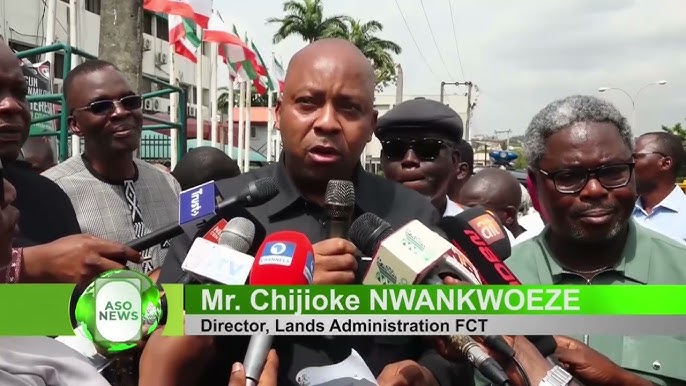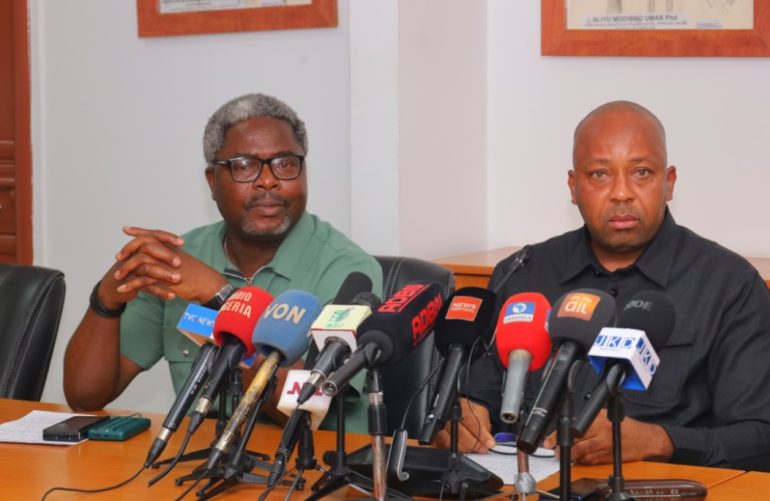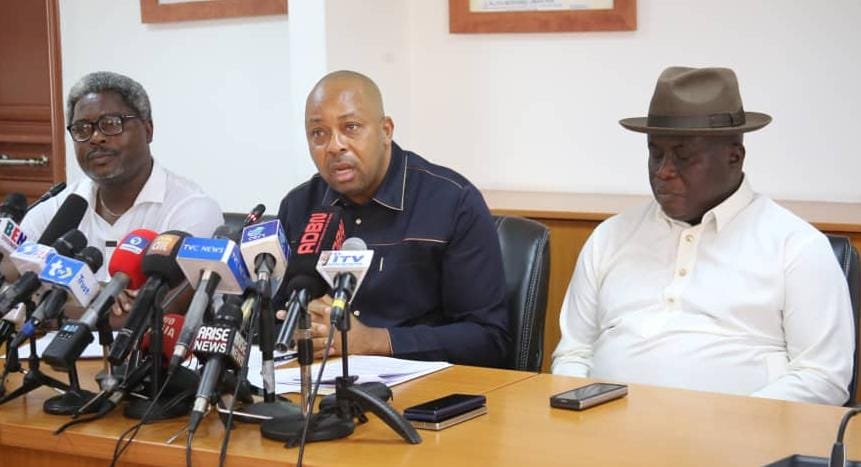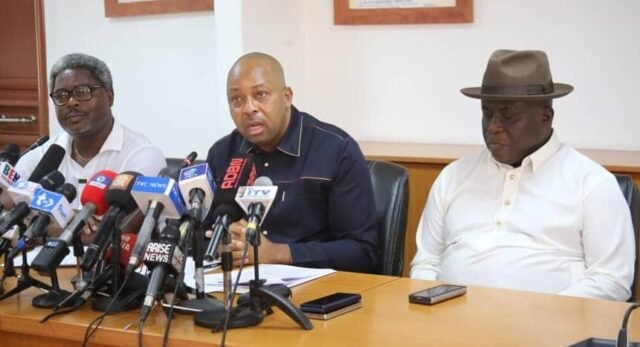A scandal of monumental proportions is now unravelling at the heart of the Federal Capital Territory Administration (FCTA). Mr Nwankwoeze Williamson Chijioke, currently the Director of Lands in the Mass Housing Department (MHD) under the Federal Capital Development Authority (FCDA), is being accused of presenting a forged certificate to buttress his academic and professional trajectory. The episode has triggered public uproar as Kwara State Polytechnic officially disowned the credential in question, escalating the crisis into a test of accountability in Nigeria’s public service.
Chijioke’s critics allege that he submitted an Ordinary National Diploma (OND) purportedly issued by Kwara State Polytechnic, Ilorin — a document which the institution affirms it never issued and thus considers forged. The certificate in question is said to have been used to gain admission into the Federal Polytechnic, Oko, where he later attained a Higher National Diploma (HND) in Architectural Technology. From that foundation, subsequent qualifications — including a bachelor’s degree and a master’s degree — were claimed, propelling him into high office.
If the allegations hold, they strike at the core of public trust. A senior official in charge of land matters within the FCTA, now facing accusations that his credentials were built on falsified records, raises serious questions about recruitment, promotion, and institutional integrity in Nigeria’s public sector.

Table of Contents
The Allegations, Polytechnic’s Position and Documented Evidence
Insider sources told SaharaReporters that long-standing whispers about Chijioke’s academic credentials gained traction following a deliberate verification push by civic groups. The inquiry led to Kwara State Polytechnic issuing a scathing denial: in a letter dated March 12, 2025 (signed by Deputy Registrar Ibrahim Eletu Saka), the Polytechnic stated unequivocally that it had no record of the OND result in question and that the document “did not emanate from the school” — branding it “fake.”
The alleged forged certificate was reportedly used to gain admission into Federal Polytechnic, Oko, where Chijioke obtained his HND in Architectural Technology. After that, he is said to have proceeded to obtain a bachelor’s degree at the University of Nigeria, Enugu Campus (UNEC), and later a master’s degree in an undisclosed discipline.
Sources contend that if the OND is proved to be fake, then the entire academic edifice built upon it collapses — meaning his admission into Oko Polytechnic and all subsequent degrees may be invalid. One insider was quoted as saying:
“This man built his entire academic and professional career on a fake foundation.”
In response, a civic accountability group, the Dependable Patriots for Nation Building and Transformation Initiative (DPNBTI), formally petitioned key authorities, including the Inspector-General of Police (IGP), the Independent Corrupt Practices and Other Related Offences Commission (ICPC), the Office of the Head of Civil Service of the Federation, and even the Presidency. Their petition accuses Chijioke of forgery, perjury, and conspiracy.
When the authorities allegedly did not respond, the organisation escalated the matter to the Federal High Court, Abuja, filing suit number FHC/ABJ/CS/2050/2025. The suit seeks a mandamus order compelling the police and the IGP to investigate and prosecute Chijioke, and requests permission for substituted service due to alleged difficulty in serving the defendant personally.
To support their arguments, petitioners pointed to relevant legal provisions. Under Sections 463–466 of the Criminal Code Act, forgery carries up to three years’ imprisonment; under Sections 117–118, perjury may attract up to fourteen years. They argue that the charges should not be shelved simply because the accused holds a senior public position.
At present, no public agency has confirmed formal charges against Chijioke. The case remains in court, awaiting judicial direction.

What This Means for FCTA: Reputation, Governance and Institutional Integrity
This scandal is not just about a single certificate or individual — it confronts the deeper challenge of credential verification in the Nigerian public service. If a person entrusted with public lands and housing mechanics can allegedly ascend by falsified academic means, what does that say about recruitment standards, internal audits, and oversight mechanisms within the FCTA and the broader civil service?
In Chijioke’s case, the alleged forgery has far-reaching consequences. As Director of Lands for the FCDA (under FCTA purview), he operates in one of the most sensitive and strategically important domains — land allocation, urban planning, and housing. Any questions about his legitimacy and competence could undermine the credibility of decisions made under his watch.
Moreover, the scandal highlights systemic vulnerabilities: weak collaboration between educational institutions and government verification agencies, absence of robust digital credential systems, and gaps in background check protocols. The fact that the Polytechnic had to outright disown the certificate speaks to how easily a falsified document can masquerade as genuine without early detection.
In public perception, such cases gravitate toward cynicism. Many Nigerians already regard certificate fraud and manipulation as pervasive in politics and bureaucracy. When the accused is a high-ranking civil servant, the narrative often becomes one of impunity — that powerful individuals escape consequence. To avoid further erosion of trust, authorities must handle this case transparently and decisively.
Legal ramifications are also significant. Should the courts uphold the allegations, Chijioke may be stripped of his post, his promotions reversed, and face criminal penalties. Beyond personal consequences, the case could set a precedent — reminding civil servants that forged credentials will no longer be tolerated.
What Happens Next for FCTA: Investigation, Accountability and Public Expectations
Going forward, all eyes now turn to three fronts: law enforcement, civil society, and the Federal High Court.
Law enforcement and anti-corruption agencies: The IGP and the Nigeria Police Force must determine whether to accept the mandamus writ and commence an investigation. The ICPC and the Code of Conduct Bureau (CCB) might also join in. They will need access to original documents, official records from Kwara Polytechnic, Federal Polytechnic Oko, the University of Nigeria Enugu, and any intermediaries involved. Witnesses, forensic examiners, and institutional officials may be called to testify.
Civil society and media: Groups like the DPNBTI must monitor the process closely to ensure it doesn’t fizzle out. They may demand regular public briefings, press statements, and insist that the case is not diluted into an internal administrative procedure. The press must likewise sustain coverage, resisting any attempts at intimidation or influence.
The Federal High Court: The judge assigned to FHC/ABJ/CS/2050/2025 will decide on procedural matters — whether substituted service is allowed, whether the writ of mandamus is justified, and eventually, whether to compel investigation. The court may also issue injunctive orders guarding against the destruction or tampering of documents. Its rulings could shape governance norms in future credential scandals.

It is widely expected that the FCTA leadership should act — either by officially placing Chijioke on administrative leave pending resolution, or by publishing his verified credentials for public scrutiny. Silence or delay could further erode confidence in the integrity of the FCTA’s administrative machinery.
Meanwhile, Kwara State Polytechnic’s role remains critical. It must cooperate fully, make available archival records, affirm or clarify any internal investigation it may conduct, and guard its reputation against being drawn into legal or media disputes.
In the broader context, this case may prompt reforms: adoption of a secure national digital academic records repository, mandatory pre-employment credential verification (at municipal and federal levels), and coordinated oversight among education institutions, accreditation bodies, and public institutions.
Already, the FCTA director certificate forgery saga has become a symbol — whether of accountability or institutional failure. Whether Nigeria treats it as a turning point or an example swept under the rug may depend on boldness from courts, resolve from investigative agencies, and vigilance from citizens.
Join Our Social Media Channels:
WhatsApp: NaijaEyes
Facebook: NaijaEyes
Twitter: NaijaEyes
Instagram: NaijaEyes
TikTok: NaijaEyes
READ THE LATEST EDUCATION NEWS





